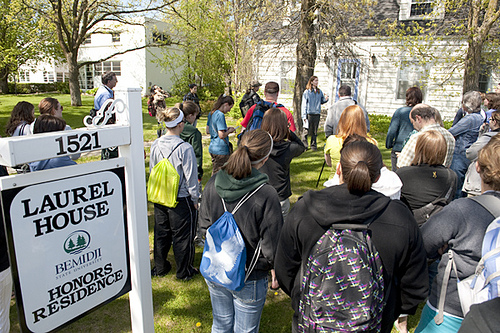May 26, 2011, Bemidji, MN – Did you know that Bemidji State University (BSU) has saved thousands of dollars through methods you can replicate in your own business, organization, municipality, or community?
Northwest Clean Energy Resource Team (NW CERT) convened a ‘Meet ‘n Greet’ tour of BSU’s improvements May 26th. Over 70 people joined the tour, including Instructor Eric Medberry’s People and the Environment class, to gain a behind-the-scenes tour of innovative sustainability sites on campus.
The event opened in Bridgeman Hall with a presentation by Erika Bailey-Johnson, Sustainability Coordinator at BSU’s Ganawendakamigaawigamig: Office of Earth-Caretaking. Her presentation highlighted ACUPCC (American College and University Presidents Climate Commitment), Traditional Skills Workshops, Bucky’s Bikes (a new bike-lease program for students), and lighting retrofits. Bailey-Johnson stated that light retrofits of Deputy Hall, the gymnasium, and the Fine Arts Complex save the University over $14,000 per year and 240,000 kilowatts annually. The retrofit lighting project was funded in part by Minnesota Schools Conserving Energy and Water (formerly Minnesota Schools Cutting Carbon).
 After a few questions from meeting participants, the group walked outside to the community garden plot, where alumna Crystal Rayamajhi explained plans for the new organic garden on campus. Students, campus staff and faculty, and community members—in that order of priority—are invited to participate in all stages of planting and harvesting the garden.
After a few questions from meeting participants, the group walked outside to the community garden plot, where alumna Crystal Rayamajhi explained plans for the new organic garden on campus. Students, campus staff and faculty, and community members—in that order of priority—are invited to participate in all stages of planting and harvesting the garden.
The tour continued to the Laurel House, a model for green remodeling (for MN GreenStar certification), a Photovoltaic-solar-powered bus stop shelter, native plant beds, the FreeStore (Otherwise known as ‘Donate, Don’t Dumpster’), and an extensive recycling system. BSU students Abbey Lindee and Dylan Sievers showed folks vermiculture (worms that convert food scraps to soil) and VendingMisers (devices installed on vending machines to save energy and money). The group also stopped by the new Elkay water bottle filling stations, which have saved thousands of plastic bottles to date.
The tour ended by visiting the lakeshore buffer zone, where natural wetland plants act as filters to prevent the lake from becoming polluted by run-off from roads and lawn fertilizers.
“The breadth of innovative projects that BSU has undertaken is truly impressive,” stated Linda Kingery, Executive Director, Northwest Regional Sustainable Development Partnership and NW CERT Steering Committee Member.
 “We were very excited to hear how well the Elkay water bottle filling station is working, since we have plans to install a similar model on campus in Crookston,” said Dan Svedarsky, director of the Center for Sustainability at the University of Minnesota Crookston.
“We were very excited to hear how well the Elkay water bottle filling station is working, since we have plans to install a similar model on campus in Crookston,” said Dan Svedarsky, director of the Center for Sustainability at the University of Minnesota Crookston.
“It’s really the students who are responsible for the achievements folks saw today,” declared Bailey-Johnson. “The students really make these projects happen, with their high level of involvement and engagement.”
“We’re thrilled that there’s such a high level of interest on the part of both the campus community and the community at large,” enthused Bailey-Johnson. “We want to get the word out about the innovative sustainability projects that are taking place at BSU so we can help other folks make similar improvements where they live or work. It’s all about helping our communities with current challenges and maintaining a thriving place for future generations to learn and grow.”
More photos from the event:
Presentation and more:
- Download Erika Bailey-Johnson’s presentation about sustainability innovations at BSU
- See more pictures
- Download a PDF version of these event highlights
About BSU: The mission of the Bemidji State University Sustainability Office, Ganawendakamigaawigamig: Office of Earth-Caretaking, is to “promote awareness and instill passion for the Earth through research, projects, and leadership.” Its vision is to “exemplify and create a culture that can exist indefinitely while in harmony with nature.” Learn more at http://www.bemidjistate.edu/sustainability.
About CERTs: The Clean Energy Resource Teams (CERTs) connect Minnesotans and their communities with resources to identify and implement energy efficiency and renewable energy projects. The Clean Energy Resource Teams are diverse—individuals; small business owners; farmers; members of community groups; local utility representatives; educators; local, state, and federal government staff and elected leaders—and all share a common interest: They want strong communities, local jobs, and secure, clean, reliable energy. CERTs is a partnership of the University of Minnesota’s Regional Sustainable Development Partnerships, Eureka Recycling, Southwest Regional Development Commission, The Minnesota Project, and Minnesota Department of Commerce, Division of Energy Resources. Learn more at http://mncerts.org.

